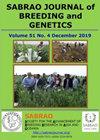小麦(triticum aestivum l .)的现状与展望乌兹别克斯坦的研究
IF 1.7
Q3 PLANT SCIENCES
引用次数: 0
摘要
小麦(Triticum spp.)是世界三分之一人口消费的主要食品之一。面包小麦(Triticum aestivum L.)是唯一具有基因组公式BBAADD的异源六倍体种。到目前为止,从选择的角度来看,这种小麦的遗传潜力有所下降。然而,解决这一问题的办法是利用小麦相关品种、古老的地方地方品种和种质资源开发高产、抗病虫害的品种。因此,利用分子工具对小麦基因库进行广泛的研究,包括鉴定主要来源,是非常有益的。对于小麦改良,育种机会通过遗传作图方法提供了显著的增强。综述了常见小麦种质资源、小麦遗传作图、鉴定和抗RWA(俄罗斯小麦蚜虫)的遗传方法、巢式关联作图群体、乌兹别克斯坦优质面包小麦品种的DNA条形码、基于DNA标记的小麦种质抗RWA筛选、乌兹别克斯坦小麦育种的未来展望、标记辅助选择的非生物抗性、乌兹别克斯坦小麦条锈病及其防治策略。锈病病原的流行病学、病原特性和品种抗性。本文章由计算机程序翻译,如有差异,请以英文原文为准。
PRESENT STATUS AND FUTURE PERSPECTIVES OF WHEAT (TRITICUM AESTIVUM L.) RESEARCH IN UZBEKISTAN
Wheat (Triticum spp.) is one of the premier staple foods consumed by one-third of the world’s population. Bread wheat (Triticum aestivum L.) is the only allohexaploid species with a genome formula BBAADD. Until now, from a selection point of view, a decline showed in the genetic potential of this type of wheat. However, the solution to this problem can be by developing high-yielding, disease- and pest-resistant cultivars using wheat-related species, ancient local landraces, and germplasm resources. Therefore, extensive study of the wheat gene pool using molecular tools, including identifying primary sources, is highly beneficial. For wheat improvement, breeding opportunities offer significant enhancements via genetic mapping approaches. The review focuses on the common wheat germplasm, wheat genetic approaches for genetic mapping, identification, and RWA (Russian wheat aphid) resistance, nested association mapping (NAM) population, DNA barcoding of Uzbekistan elite bread wheat cultivars, DNA marker-based screening of wheat germplasm for RWA resistance, future perspectives of wheat breeding in Uzbekistan, marker-assisted selection for abiotic stress tolerance, wheat stripe rust and its control strategies in Uzbekistan, epidemiology of the rust pathogens, pathogen characterization, and varietal resistance.
求助全文
通过发布文献求助,成功后即可免费获取论文全文。
去求助
来源期刊

Sabrao Journal of Breeding and Genetics
农林科学-奶制品与动物科学
CiteScore
1.90
自引率
50.00%
发文量
63
期刊介绍:
The SABRAO Journal of Breeding and Genetics is an international journal of plant breeding and genetics research and was first published in 1969. It is the official publication of the Society for the Advancement of Breeding Research in Asia and Oceania (SABRAO).
Its objectives are to: promote the international exchange of research information on plant breeding and genetics, by describing new research findings, or ideas of a basic or practical nature; and be a medium for the exchange of ideas and news regarding members of the Society.
The Journal gives priority to articles that are of direct relevance to plant breeders and with emphasis on the Asian region. Invited for publication are research articles, short communications, methods, reviews, commentaries, and opinion articles. Scientific contributions are refereed and edited to international standards.
The journal publishes articles for SABRAO members mainly. The Journal preferred strongly that at least one author should be a current member of the Society. Non-members may also publish in the journal.
 求助内容:
求助内容: 应助结果提醒方式:
应助结果提醒方式:


